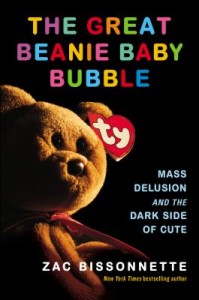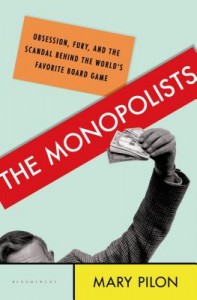Over the last couple of weeks, I found myself drawn back to some books that I know fall right in the middle of my reading wheelhouse — well-reported nonfiction on quirky subjects. In this case, both The Great Beanie Baby Bubble and The Monopolists use stories about the cutthroat business of toys to explore large questions in history, economics and American culture. I can’t wait to tell you about them both.
The Great Beanie Baby Bubble by Zac Bissonnette
 As a fifth grader, I was totally obsessed with Beanie Babies. During the height of my mania, my best friend and I staged an elaborate Beanie wedding between two of our Beanie Babies, George the Gorilla and Bessie the Cow, that included tiny cakes, carefully chosen music, and many, many, many Beanie Baby wedding guests.
As a fifth grader, I was totally obsessed with Beanie Babies. During the height of my mania, my best friend and I staged an elaborate Beanie wedding between two of our Beanie Babies, George the Gorilla and Bessie the Cow, that included tiny cakes, carefully chosen music, and many, many, many Beanie Baby wedding guests.
The joy of play is not what led to the massive obsession with Beanie Babies that characterized much of the years 1996 to 1999. Zac Bissonnette writes about this period, as well as enigmatic and unpleasant Beanie Baby creator Ty Warner in The Great Beanie Baby Bubble: Mass Delusion and the Dark Side of Cute.
This book is totally awesome. It has, no joke, some of the best quotes from interviews that I’ve ever read in a reported work of nonfiction — a testament, I’d guess, to both what a good reporter Bissonnette is and to how much people who worked with Ty Warner actually hate him now. Warner declined to be interviewed for the book, but I think Bissonnette’s reporting paints a fairly accurate (and sometimes sympathetic) portrait of a man who is best known for his creativity, ruthlessness and aptitude for persuasion.
In addition to capitalizing on the nostalgia of Beanie Babies, Bissonnette uses the Beanie Baby craze to look more broadly at consumer economics issues like speculative markets and the way behavioral fallacies lead to bad economic decisions. The market forces and personal choices that led to the rise and crash of Beanie Babies are the same issues that led to the Internet stock bubble and, even more recently, the mortgage-backed securities that led to the economic collapse of 2008.
The Great Beanie Baby Bubble is a heck of a fun read, as well as a smart look at some important issues in economics that consumers would benefit from understanding better. I tore through this one in a single day.
The Monopolists by Mary Pilon
 The Monopolists: Obsession, Fury, and the Scandal Behind the World’s Favorite Board Game by Mary Pilon is so perfectly in my nonfiction sweet spot that I could have written it myself. And I wish that I had, because The Monopolists is pretty great.
The Monopolists: Obsession, Fury, and the Scandal Behind the World’s Favorite Board Game by Mary Pilon is so perfectly in my nonfiction sweet spot that I could have written it myself. And I wish that I had, because The Monopolists is pretty great.
In this book, journalist Mary Pilon shares the little-known history of Monopoly. As it turns out, the history of the game that Parker Brothers has tried to sell — unemployed salesman Charles Darrow came up with the idea for the game alone during the Great Depression — ignores the long history the game had in the public domain. And, even worse, it ignores the female activist who came up with one of the earliest versions of the game, Lizzie Magie.
In addition to bringing to light a woman who has had her story nearly erased, the book is great because it situates Monopoly — as well as the game’s predecessors and followers — within the cultural and economic contexts of United State history. Lizzie Magie’s first version, The Landlord’s Game, was inspired by the single tax system at the turn of the century. Monopoly as we know it took off during the Great Depression as a way for people to live large while life was tough, while Anti-Monopoly was a response to the economics of the 1970s. And board games in general became popular as part of a larger cultural shift that allowed for more leisure time and family time.
The Monopolists is great as a cultural history, a legal “thriller,” a feminist exploration and a primer on the competitive world of board game development. I highly recommend it.
What are some of your favorite books about the business of toys?

Comments on this entry are closed.
Okay, I have to read The Great Beanie Baby Bubble. Have you read Jezebel’s piece about Lisa Frank? It’s one of my favorite “dark side of the nostalgia” reads, and it seems like it might be similar but shorter: http://jezebel.com/inside-the-rainbow-gulag-the-technicolor-rise-and-fall-1179495705
I have not read that piece, thanks for linking to it! I was just talking about Lisa Frank with someone a few days ago… weird.
I had heard about the Beanie Baby book and thought it sounded quite interesting. Had not heard about the Monopoly book. Even more interesting. Will have to check both of these out. Books about these cultural trends are so intriguing, especially when it’s something that has happened in your lifetime and you can remember stuff. Lovely.
Remembering the whole Beanie Baby trend was definitely part of what I liked about Bissionette’s book — lots of nostalgia.
I saw these on your IG feed and knew I had to read them, but you’ve bumped them higher on my list. Great reviews!
I definitely need to read The Great Beanie Baby Bubble! Thanks for putting it on my radar!
I cannot wait to read about the Beanie Babies. I still have a few I’ve been passing off to my daughter-I laugh every time at what we thought they were going to be worth.
In retrospect it seems kind of silly, but I think the author does a good job of showing how the same flawed thinking could have much bigger consequences in other areas of life.
I loved Beanie Babies when they were a thing, although I never truly thought they were going to be worth anything (I took all the tags off mine, despite being urged by everyone not to). They just had such sweet little faces! I have gotten rid of most of mine now, but there are a few I can’t stand to part with (the black bear that was the first one I ever got, the little hedgehog), so those are still floating around my apartment.
None of the ones I have saved at home have tags either, those got cut off immediately! I really want to bring the ones I saved to my new house now — I miss their little faces 🙂
I’m not sure I’ve ever read a book about the toy business, but the Beanie Baby one definitely sounds interesting. I never realized the creator was so loathed – I never knew anything about him at all, in fact, not even his name. I wish I could get interested in the Monopoly book, but I just really hate that game, and this feeling overrides even the interesting tidbits you’ve mentioned in your review.
I’d never thought about the creator of Beanie Babies before this book either. Most people who used to work for him seemed too scared to talk on the record, or just plain didn’t like him. Very strange!
Now I’m even MORE interested in the Beanie Baby book!! Both of these titles sounds great, but that one sounds especially fascinating.
I put both of these on my paperbackswap wishlist! I had loads of beanie babies…many sat in the back window of my little car so I could show them off! Lol. And in 1996 I was into my senior year of high school! So, no age escaped the cuteness.
I just added both of these to my TBR. I love this kind of narrative, quirky nonfiction, I think this is my nonfiction sweet spot as well. I’m especially interested in the Beanie Baby book – my grandma was an avid collector of many things for me, but Beanie Babies were definitely high on the list. Like many things that she thought were going to have value someday, I wasn’t really allowed to play with them, but I had box after box filled with them.
I love that your grandma collected them for you! Do you still have any of them? What happened after it became clear they weren’t going to be worth anything?
I love Monopoly and that book sounds awesome!
I hated playing Monopoly when I was a kid and it was one reason I never wanted to consider studying business in college. But the book sounds fascinating.
I never really liked playing Monopoly either, but it was fun to read about it!
Gosh, I love great non-fiction that just flows. I am interested in reading about pretty much any subject, as long as the writing is awesome. I’m gonna have to add these to my TBR.
I also enjoyed The Monopolists for all of the reasons you mentioned. Quirky nonfiction is the best 🙂